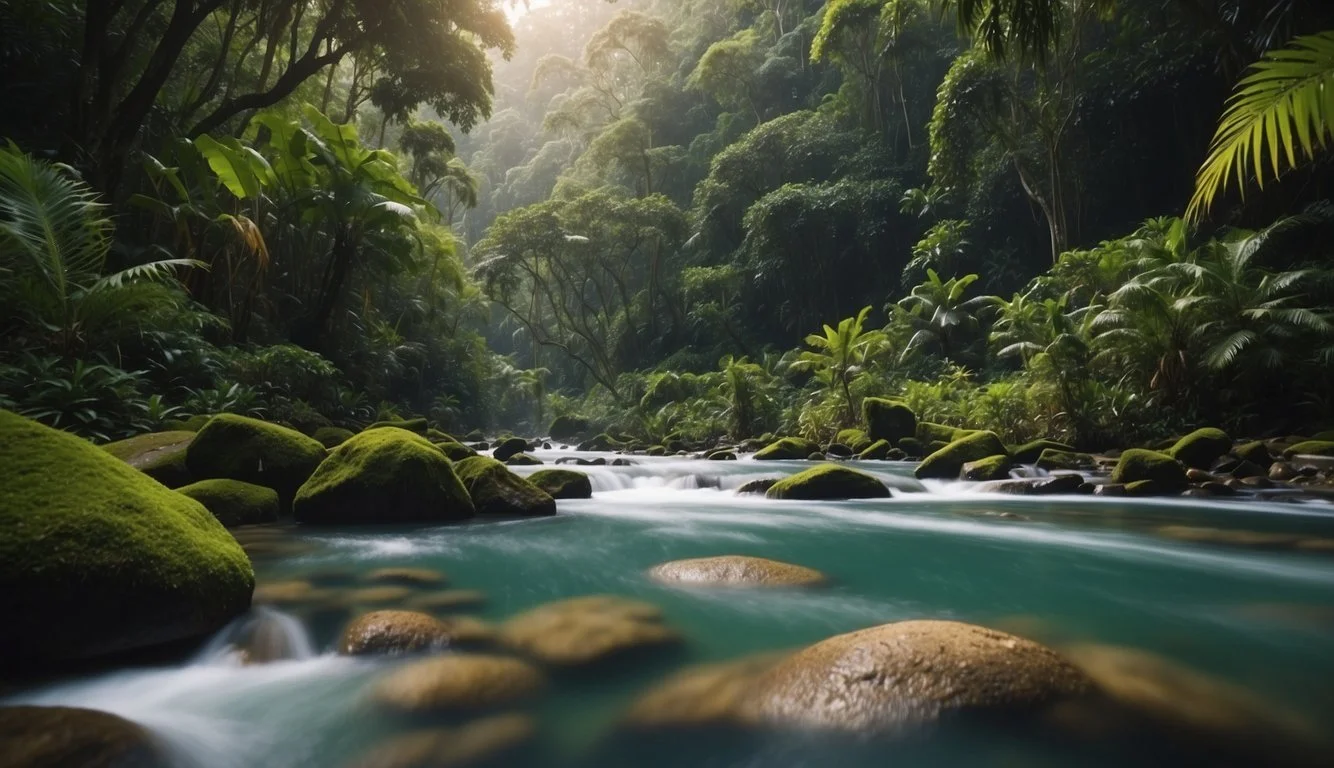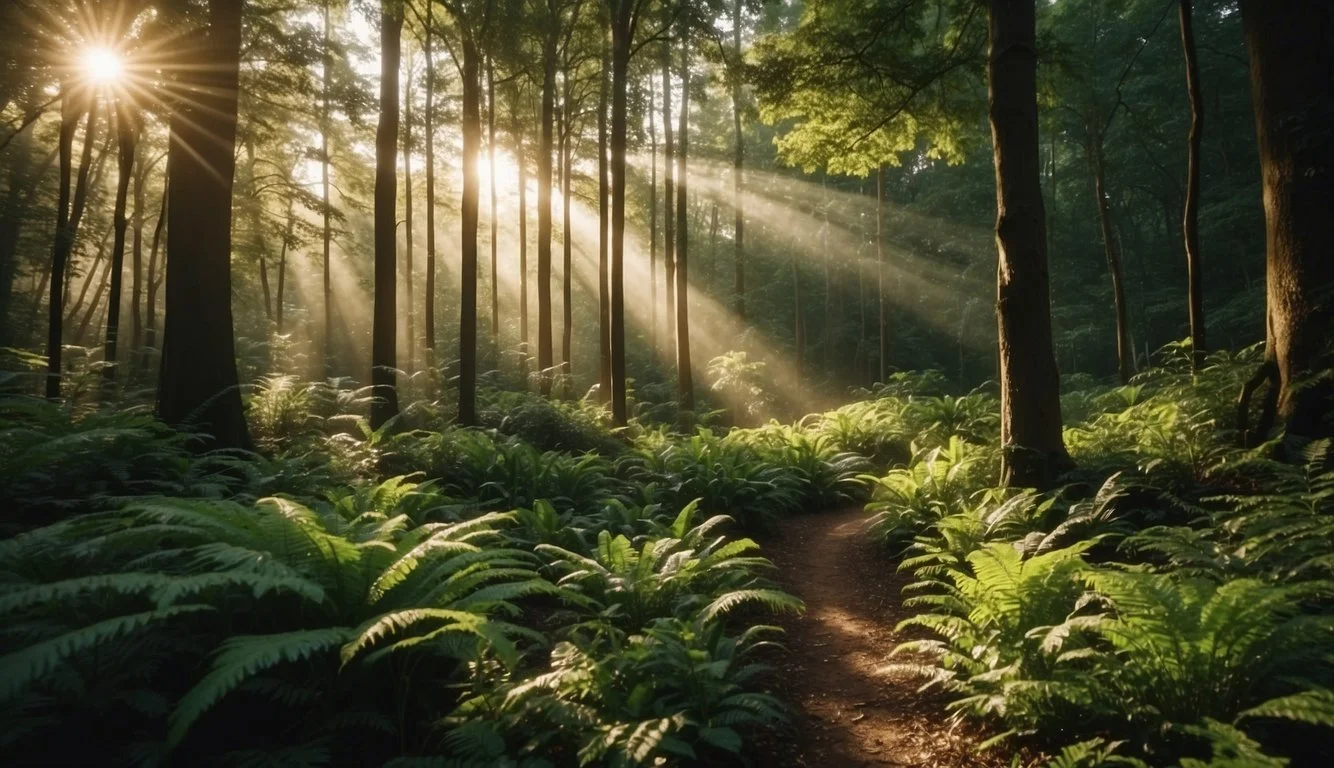Documentary Review: Life on Our Planet (2023)
A Masterpiece of Nature Filmmaking
Morgan Freeman’s deep, resonant narration guides viewers through "Life on Our Planet," a captivating docuseries on Netflix that outlines Earth's 4.5 billion-year history. The series delves into the evolution, survival, and extinction of countless species, using stunning CGI and compelling storytelling to bring the past to life. Spanning eight episodes, each lasting between forty-five minutes to an hour, the show provides an in-depth look at pivotal moments in natural history, such as mass extinctions and the age of dinosaurs.
The series stands out for its impressive digital effects and nature photography. Across its episodes, viewers journey through significant evolutionary milestones and cataclysmic events that have reshaped life on Earth. As Freeman narrates the rise and fall of ruling dynasties, the series illuminates how today's flora and fauna are the culmination of an intricate and lengthy process.
"Life on Our Planet" is not just a visual treat; it's a thoughtful examination of our planet's rich evolutionary tapestry. The storytelling, combined with expert insights, makes it a worthwhile watch for both nature enthusiasts and casual viewers alike.
Contextual Background
The rise of environmental documentaries has transformed how audiences engage with the natural world. "Life on Our Planet" occupies a significant position in this genre, offering unique insights into Earth's extensive history.
Environmental Documentaries Landscape
Environmental documentaries have grown in popularity and influence over recent decades. Pioneers like David Attenborough's series have set high standards, blending scientific accuracy with visual storytelling. These documentaries not only educate but also inspire conservation efforts.
The genre covers a wide range of topics, from climate change to species extinction. Technological advancements, especially in camera equipment and CGI, have expanded the scope and impact of these films. Platforms like Netflix have made them more accessible, reaching global audiences.
Significance of 'Life on Our Planet' Within the Genre
"Life on Our Planet" stands out due to its comprehensive narrative. Spanning four billion years, it chronicles Earth's history through major events like mass extinctions and the rise and fall of various species.
Narrated by Morgan Freeman and featuring contributions from experts, the series integrates cutting-edge digital effects and remarkable natural footage. Executive producer Steven Spielberg's involvement highlights the project's ambition. Despite some critiques, its blend of education and entertainment makes it a noteworthy addition to the genre.
Filmmaking Techniques
"Life on Our Planet" utilizes a blend of cutting-edge cinematography, a carefully constructed narrative, and an immersive sound design to captivate audiences. These elements work in harmony to bring the prehistoric past to life while highlighting the beauty of the natural world.
Cinematography and Visuals
The visual storytelling of "Life on Our Planet" is anchored by stunning digital effects and natural photography. Jamie McPherson's dynamic camera work ensures that each scene feels alive and engaging. Visuals blend modern nature footage with computer-generated imagery to recreate extinct species and ancient environments authentically.
High-definition cameras capture intricate details, making every frame visually arresting. The juxtaposition of CGI and real-world footage creates a seamless viewing experience that bridges the ancient and the modern.
Narrative Structure
The documentary employs a compelling narrative structure to explore Earth's four-billion-year history. Morgan Freeman's narration provides a cohesive thread, guiding viewers through complexities with clarity. He lends gravitas to the storytelling, making the scientific content accessible.
Each episode focuses on different eras and themes, creating a logical progression through time. This structured approach ensures that viewers can follow the evolutionary timeline without feeling lost.
Music and Sound Design
The soundscape of "Life on Our Planet" is meticulously crafted to enhance the visual and narrative elements. The musical score complements the emotional tone of each scene, whether highlighting awe-inspiring vistas or moments of tension. Composers use orchestral arrangements to add a sense of grandeur.
Sound effects are equally crucial, with realistic animal calls and environmental sounds enriching the immersive experience. These auditory cues help bring the prehistoric world to life, creating a multi-sensory journey for viewers.
Content Analysis
Life on Our Planet (2023) explores the evolution of life through vivid storytelling and stunning visuals but has received mixed reviews regarding its depth and presentation. This section delves into the thematic elements, scientific credibility, and how the subject matter is handled.
Thematic Exploration
The series covers multiple eras of life on Earth, from the dawn of life over 4 billion years ago to recent times. The narrative includes the rise and fall of various species, highlighting five major mass extinctions. This thematic journey attempts to show the resilience and adaptability of life. However, some critics argue that the series' storytelling feels disconnected at times, with transitions between major events lacking smoothness.
Scientific Accuracy
While the visual effects are praised for their quality, there's a noted absence of in-depth scientific explanations. Crucial elements like the causes behind rising carbon dioxide levels during extinction events are glossed over. The series could benefit from incorporating more scientific diagrams and expert interviews to provide a clearer understanding of evolutionary processes. Despite this, the facts presented are generally accurate, though simplified.
Subject Matter Treatment
Narrated by Morgan Freeman, the documentary aims to engage audiences with its grand storytelling. However, the treatment of the subject matter has been criticized for being superficial. Important topics such as the evolutionary significance of certain species or the detailed mechanisms of mass extinctions are not thoroughly examined. This has led some viewers to perceive the series as more entertainment-focused rather than educational. The inclusion of more detailed explorations could enhance its informative value.
Impact and Reception
"Life on Our Planet" has garnered attention for its digital effects, narration by Morgan Freeman, and comprehensive exploration of Earth's history. Critical reviews and public reaction highlight both the documentary's achievements and its shortcomings.
Critical Reception
Critics have praised "Life on Our Planet" for its stunning visuals and expert storytelling. Morgan Freeman's narration adds gravitas to the series, enhancing its appeal. The use of advanced CGI techniques has been noted for bringing prehistoric eras to life.
Rotten Tomatoes features a high rating, citing the series as "hugely entertaining." Reviews indicate a strong appreciation for the way the documentary manages to cover billions of years in an engaging manner. Authorities on evolution have particularly lauded the educational value it brings to viewers.
Public Reaction
Viewers have responded favorably to the series, with many appreciating the mix of scientific detail and visually arresting scenes. Social media buzz suggests that the series has succeeded in capturing the imagination of a diverse audience.
Some viewers compare it to other high-profile documentaries like "Prehistoric Planet" and "Planet Dinosaur", often in a positive light. The general consensus is that "Life on Our Planet" combined entertainment with education effectively, reaching a broad demographic.
Influence on Environmental Policy
The documentary has sparked discussions among policymakers and environmentalists. By illustrating the long-term impacts of climate change and species extinction, it has become a talking point in environmental circles.
Advocates are using the series to highlight the urgency of conservation efforts. Steven Spielberg's involvement adds weight, potentially influencing policymakers to consider more stringent environmental regulations. The focus on mass extinctions has been particularly impactful, serving as a stark reminder of the stakes involved in neglecting ecological stewardship.
Director's Perspective
Steven Spielberg, a renowned filmmaker, collaborates with an experienced team to bring "Life on Our Planet" to life. This series is noted for its visual storytelling and cinematic quality.
Spielberg's vision emphasizes the epic journey of life over four billion years. He aims to make complex biological evolution accessible and engaging. By integrating state-of-the-art digital effects, the series brings prehistoric scenes to vivid life.
Jamie McPherson's role as a camera operator adds a dynamic touch. His filming style ensures that viewers feel immersed in natural settings. This approach contributes significantly to the series' authentic documentary feel.
Morgan Freeman's narration complements Spielberg’s direction, offering a guiding voice throughout the series. Freeman's involvement adds a layer of gravitas, enhancing the educational value.
The direction focuses on key evolutionary milestones and mass extinctions. Spielberg’s team ensures these events are presented clearly without overwhelming the audience. Storytelling is central, engaging viewers with compelling narratives.
Directorial choices also include showcasing a range of species, from underdogs to ruling dynasties. This diverse representation aims to highlight the complexity and interconnectedness of life on Earth.
The production team, behind acclaimed works like "Our Planet," applies their expertise to this series. Their goal: create a visually stunning and informative documentary.
Spielberg's meticulous attention to detail is evident in every frame. He balances scientific accuracy with storytelling, making "Life on Our Planet" both educational and entertaining. This series stands as a testament to Spielberg's mastery in documentary filmmaking.
Personal Reflections
Watching "Life on Our Planet (2023)" is an immersive experience. The narrations by Morgan Freeman add a profound dimension to each scene. His voice brings depth, making the journey through billions of years feel both personal and epic.
The digital effects and nature photography are breathtaking. Each frame is meticulously crafted, displaying the planet's beauty. The use of technology enhances the storytelling, making it visually striking.
David Attenborough's involvement provides a unique touch. Having him as part of the narrative strengthens the documentary’s message. His expertise and passion for nature are evident throughout.
The theme of mass extinctions leaves a lasting impact. It serves as a reminder of the planet's fragile state. The challenges and triumphs of life offer much to ponder.
Netflix’s platform makes it accessible to a large audience. This accessibility underscores the importance of spreading awareness about the natural world. It’s an opportunity for viewers to connect with Earth’s history.
Viewing this documentary prompts reflection on humanity’s role in the environment. It raises pertinent questions about conservation and responsibility. The visual and narrative elements work together to emphasize these points.
Experiencing "Life on Our Planet" is more than just educational. It’s an invitation to appreciate and protect the natural world. The documentary succeeds in engaging viewers on multiple levels, blending science with stunning visuals.
Comparative Analysis
"Life on Our Planet" (2023) offers a panoramic look at Earth's 4 billion-year journey with rich digital effects and stunning nature photography. This documentary is evaluated through comparisons with similar genre works and fictional narratives.
Similar Works in the Genre
"Life on Our Planet" compares favorably with other celebrated nature documentaries, such as "Planet Earth" and "Our Planet." A distinguishing feature is Morgan Freeman's expert narration, which, paired with high-quality visual effects, brings the ancient world to life.
The series mirrors the educational layout of "Cosmos" by providing an episodic deep dive into Earth's evolutionary history. Each episode explores critical epochs, much like "Blue Planet II," which focuses on specific marine ecosystems.
Contrast with Fictional Environmental Narratives
Unlike fictional works like "Avatar," which blend environmental themes with fantasy, "Life on Our Planet" adheres strictly to factual content. The documentary does not anthropomorphize animals or create hypothetical scenarios but relies on scientific evidence and reconstructions.
Fictional environmental narratives often dramatize ecological issues for effect. In contrast, this documentary utilizes real-world data and events, such as mass extinctions and ice ages, to educate and inform.
By maintaining factual rigor, "Life on Our Planet" ensures that viewers gain an authentic understanding of Earth's historical transformations without fictional embellishment. In doing so, it serves as a valuable educational resource distinct from entertainment-driven narratives.
Conclusion and Outlook
"Life on Our Planet" provides viewers with a visually captivating journey through the evolutionary history of life on Earth. The series, produced by Amblin Television and Silverback Films, features stunning visual effects and high production value, making it a treat for nature documentary enthusiasts.
Presented by Steven Spielberg and narrated by Morgan Freeman, the documentary's storytelling is engaging and educational. The detailed exploration of complex life forms and their evolutionary paths offers a significant learning experience for audiences of all ages.
Despite the visual appeal, the series has received mixed reviews. While the cinematography and special effects are praised, some critics feel that it does not offer new insights into the well-trodden subject of Earth's history.
The documentary underscores the importance of biodiversity and the urgent need for conservation efforts. David Attenborough's call for divestment from fossil fuels is echoed within the series, emphasizing the responsibility of financial institutions in ensuring a sustainable future.
The wider relevance of "Life on Our Planet" lies in its ability to inspire action and awareness about environmental issues. The show aims to motivate individuals and policymakers to prioritize the preservation of our planet's biodiversity.
For those seeking streaming options, "Life on Our Planet" is available on popular platforms such as Netflix. The accessibility ensures that it can reach a broad audience, furthering its impact.
In focusing on both the beauty of the natural world and the pressing environmental challenges, "Life on Our Planet" serves as a reminder of the delicate balance required to maintain and protect our planet's ecosystems.








